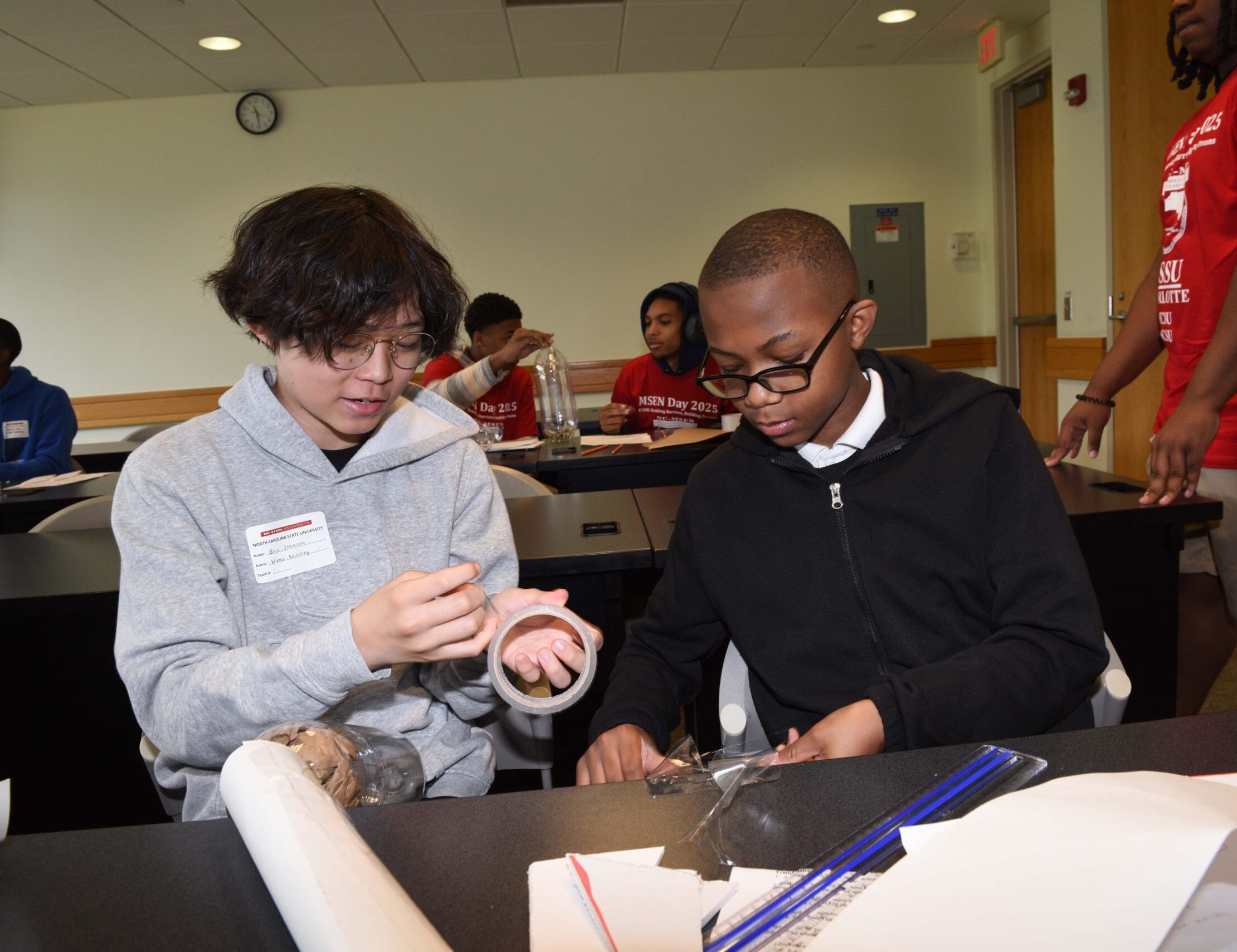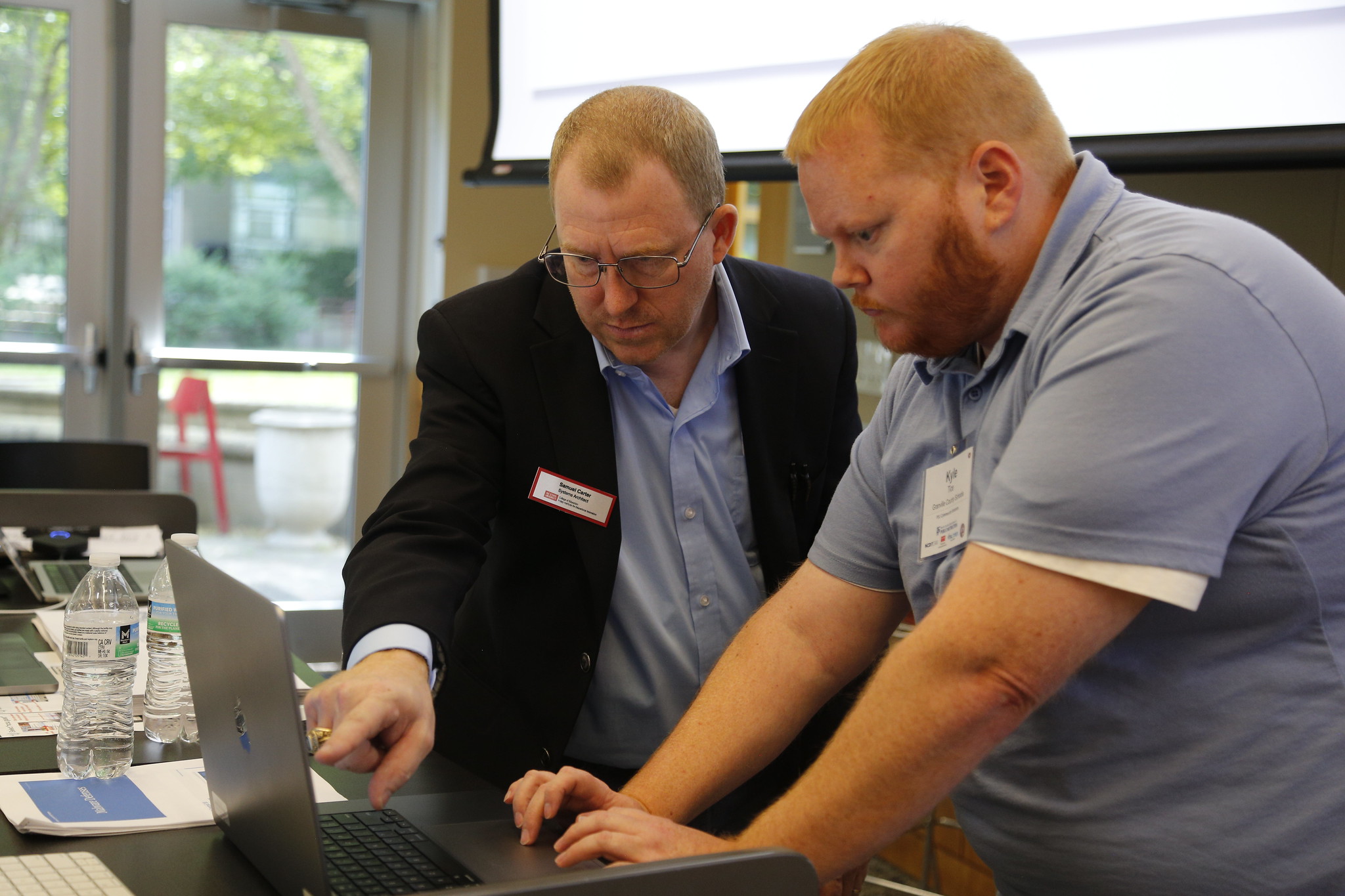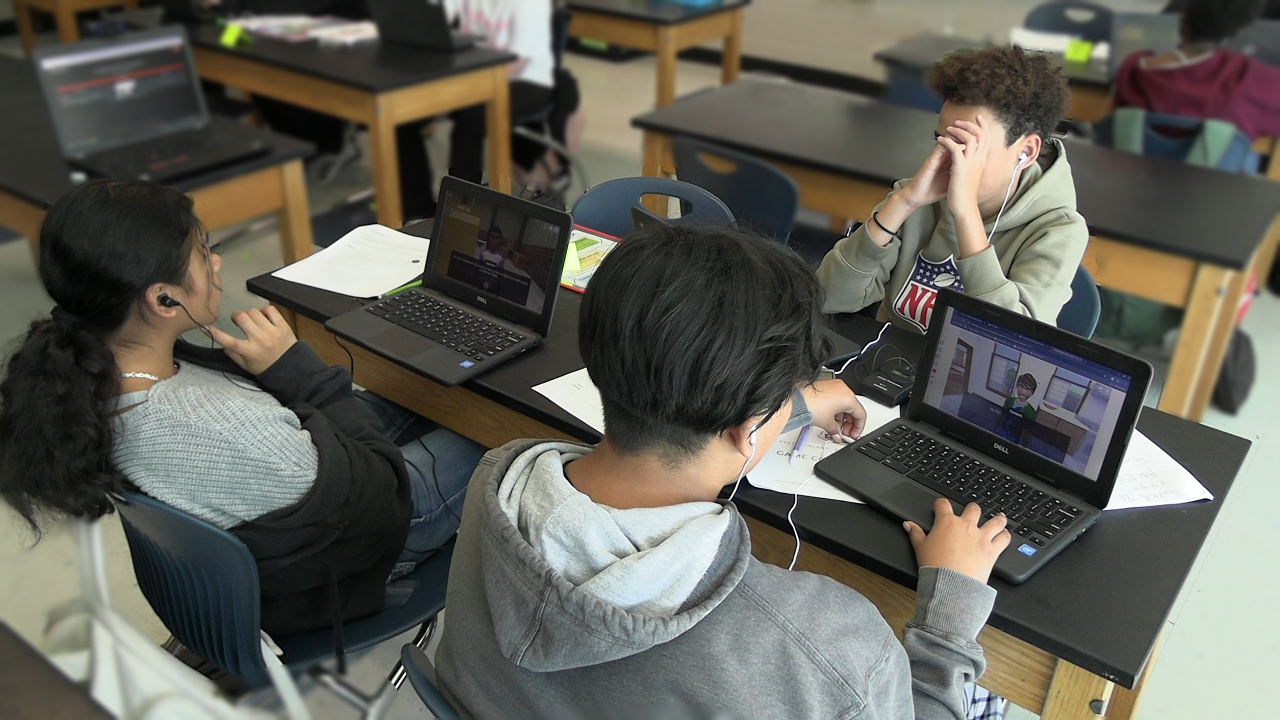Catalyst Grant Empowers Rural Students, Enhances Computational Thinking Through STEAM Club
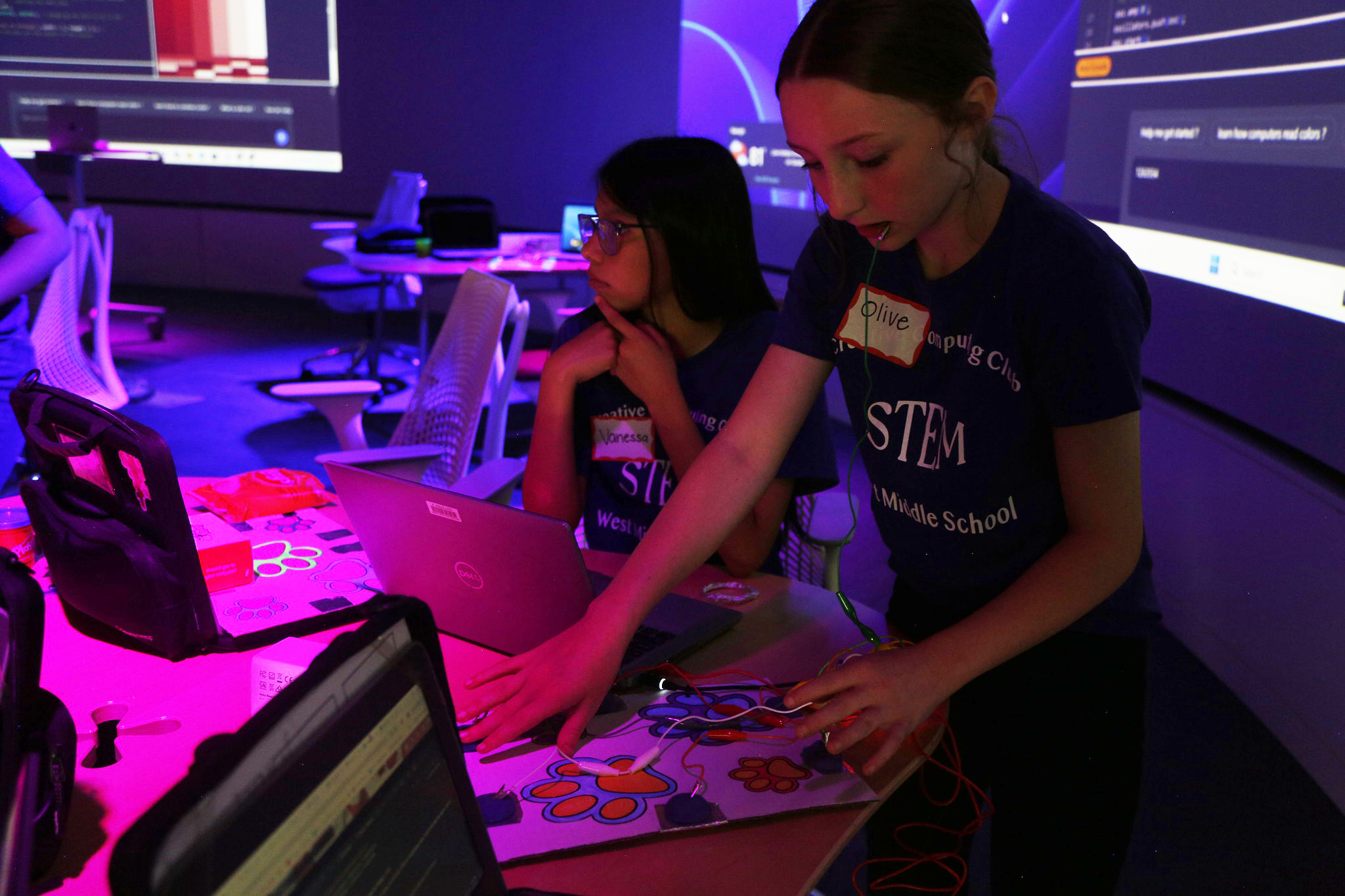
West Middle School sixth grader Olive Cleckler discovered an unexpected way to complete her interactive project—by turning her braces into part of a functioning circuit. Using a custom-designed platform called ArtAlgo, which blends coding, digital artmaking and AI-powered assistance, alongside Makey Makey kits, Olive explored how everyday materials could become tools for creative expression and computation.
Her improvisational tinkering—and the support she received from an AI teammate embedded in ArtAlgo—captures the heart of the project: reimagining coding as a creative and collaborative practice between youth and intelligent systems.
Olive’s creativity and curiosity is exactly what researchers at the Friday Institute for Educational Innovation and NC State’s College of Education aimed to develop during their Catalyst Grant project.
“We set out to transform the way coding is perceived—from a rigid, intimidating task into a creative practice that encourages experimentation, self-expression and the design of interactive digital art,” said Joey Huang, assistant professor of learning, design and technology in the College of Education and principal investigator (PI) for the Catalyst Grant ‘Empowering Rural Young Girls: Enhancing Computational Thinking Through a STEAM Club.’ “By combining creative coding with AI-supported guidance, we aim to help students engage more deeply with concepts like patterns, algorithms and data representation in ways that feel relevant and fun.”
Huang’s project was funded through the Catalyst Grant program, a joint program funded by the Friday Institute and College of Education to increase research collaborations among faculty and staff in the College of Education departments and those located at the Friday Institute. A primary objective of this program is to “seed” collaborative research that will lead to further research and support from external granting agencies.
The project team includes Huang, Carrie Robledo, computer science research scholar at the Friday Institute; and Rebekah Davis, research scholar at the Friday Institute.

Partnering with West Middle School’s Creative Computing Club in Mount Gilead, North Carolina, the project team led a five-session workshop where students explored both digital and physical computing. Sessions focused on their proprietary ArtAlgo platform and Makey Makey kits to connect their digital art to physical interactions. The project team introduced computational thinking and physical computing concepts and skills to students through making and crafting activities and fostered positive engagement, motivation and empowerment for female youth towards computing and STEM.
ArtAlgo was conceptualized and designed by Huang, and the platform was developed in collaboration with Assistant Professor Dongkuan (DK) Xu’s computer science team, with graduate research assistant Harsh Mauny, an NC State Computer Science graduate research assistant, leading the technical implementation. ArtAlgo supports open-ended exploration through visual coding and AI-assisted design, creating a playful, accessible entry point into computational thinking through art. Not only does ArtAlgo help students develop confidence and agency in their creative and computational abilities, but also it explores what it means to learn alongside intelligent systems, how AI can act as a design partner and new possibilities for human-machine collaboration in learning.
Across the sessions, students engaged in playful coding, hands-on tinkering and open-ended design challenges that blended creativity with computer science concepts. Students explored how computers “see” color through RGB and hex codes, learned color theory, created visual palettes through code and blended creativity with programming.
“The club and school gained several unique benefits from the project that they likely wouldn’t have had access to otherwise,” said Robledo. “For students, it opened up new ways of thinking about technology, not just as something to consume or use but as a tool for creativity. For many of the students, this was their first experience with coding, so this allowed them a space to explore CS, make mistakes and learn from them, which provided a boost of confidence in coding, AI and physical computing. It also gave students a sense of ownership and pride in their work, especially during the public showcase, where they saw their ideas come to life and received recognition for their efforts.”
“They loved this,” said Nora Beasley, a sixth grade science teacher at West Middle School. “I mean, the fact that they could take on this project as their own—and you can see that they definitely took ownership of these projects—they have impressed me. Just their knowledge about coding and how they can tell you that this means certain things.”
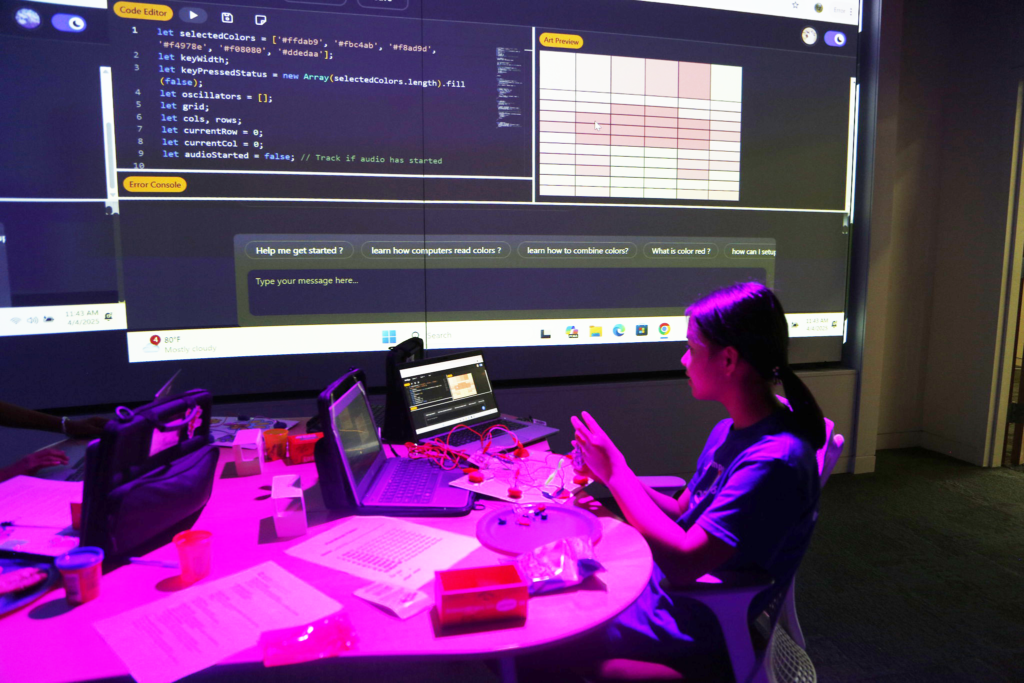
For their final project, students built interactive mosaic pianos using Makey Makey boards and conductive objects, combining digital art, physical computing and sound. The final day was a showcase April 4 in Hunt Library at NC State, where students demonstrated their creations and reflected on how coding, AI and physical tech can be tools for creative self-expression.
Sixth grader Vanessa Ramirez was inspired by our galaxy for her ArtAlgo project. Through the program, she enjoyed seeing what she could do through coding through the platform.
“I like the galaxy and stars,” said Ramirez. “[With ArtAlgo] I could make images and different songs. That’s what I like the most. I liked coding and seeing what else I could with coding.”
The project team also provided professional development (PD) sessions with teachers to expand their understanding of how computer science can be integrated meaningfully into different content areas, even without deep technical expertise.
“It encouraged them to step into the role of co-learners with their students and explore technology in more creative, student-centered ways,” said Robledo. “The support and professional development they received helped build their confidence and capacity to continue integrating these ideas into their classrooms.”
The Catalyst Grant supported platform development for ArtAlgo, materials for the physical computing activities and funding to bring in a co-leading teacher—something that made a huge difference in building strong relationships with students. Most importantly, the grant gave the team the time and space to take a design-based, iterative approach. They were able to prototype, adapt quickly based on student feedback and reflect deeply on what worked and what could be improved.
Next, the project team hopes to build on their momentum from this project and expand ArtAlgo with more AI-powered design support and deeper integration with physical computing tools. This summer, they are planning a new workshop at an art museum and collaborating with college students to further develop the platform’s design.
This project has also served as an important preliminary study that is directly informing larger proposals currently in development. The team used their interactions with students to contribute to research on effective program strategies for engaging youth in computer education in rural and high-poverty areas. The insights and data gathered through this work have been instrumental in shaping research questions, design goals and a long-term vision for supporting creative computing and AI-assisted learning in informal settings.
- Categories:
